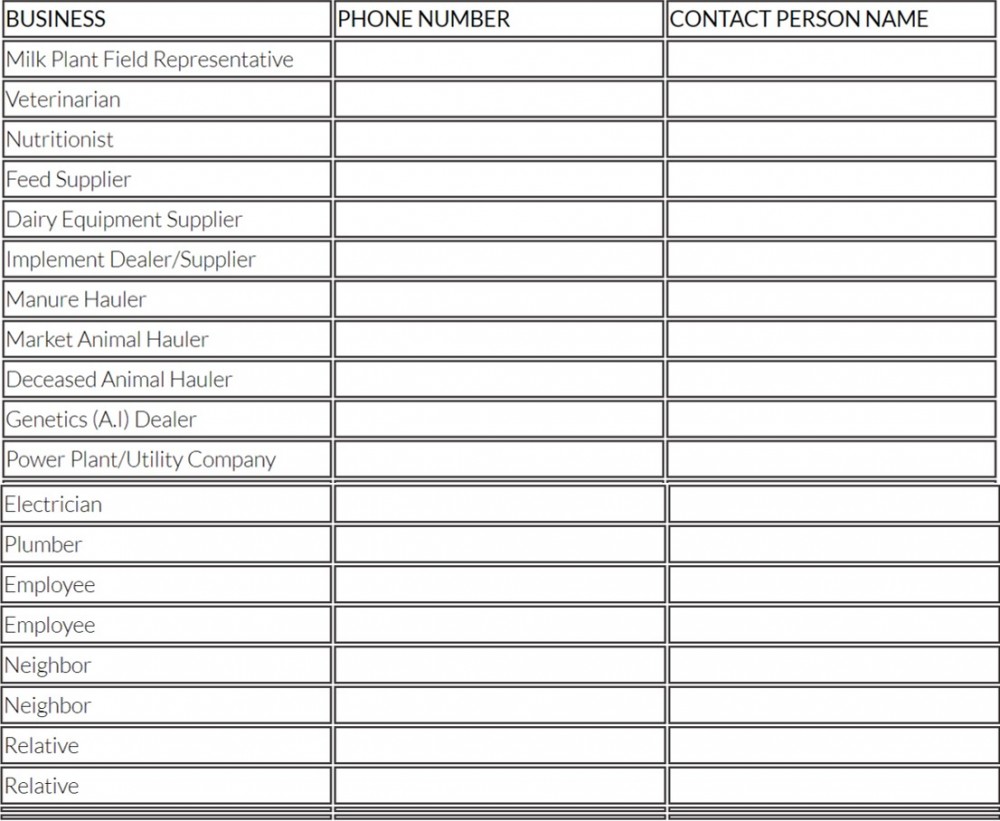Creating a Dairy Farm Operating Plan
Alycia Drwencke, Dairy Management Specialist
Southwest New York Dairy, Livestock and Field Crops Program
Creating a Dairy Farm Operating Plan
Written by Paul Mitchell, ASHLEY A OLSON, Carl Duley, RYAN A STERRY and JEROME R CLARK at the University of Wisconsin-Madison
Given all the uncertainty this year with the corona virus pandemic and COVID-19, it is more important than usual to have a clear and easily available farm operating plan. If COVID-19 strikes your family, you may be incapacitated or distracted and unable to complete critical farm operations, especially spring planting. The farm operating plan identifies people who are familiar with the farm to take over operations if you are unable to farm for a while and provides clarity on what needs to be done. Family, friends, and neighbors will also likely step up to help, but they will need to know what to do. That is the purpose of the farm operating plan - to help those who will want to help you when you need it. It will be one less thing to worry about during difficult times. If you need to help someone else, it will make it easier for you if they have a farm operating plan as a guide.
An example template is provided to help create a farm operating plan for a dairy farm. Make a few copies of your final plan and be sure they are easy to find. Share them with your back up operators so they can make sure your cows are milked and given proper care.
Be sure to have the name and address of the farm(s) located on the protocol so the worker(s) knows where to tell the business to show up if they are unfamiliar. Also have instructions if vendors and helpers should or should not visit the house, barn, etc. without contacting first.
OWNER & FARM(s) Name:__________________________________________________________
PHONE NUMBER:_________________________________________________________________
FARM(s) ADDRESS:________________________________________________________________
_________________________________________________________________
_________________________________________________________________
It is important to have phone numbers of businesses and people that your dairy utilizes for everyday questions or in the event of an emergency. Below are examples of businesses and people that are recommended to have their contact information:

If your dairy operation has other businesses that they utilize on a frequent basis make sure to add to this template.
Besides having the farm address and important phone numbers readily available for those who may be filling in during an illness, it is also a good idea to have written protocols in place for each aspect of your dairy. Here is a recommended list of protocols to have developed:
- Milkhouse and parlor set up/takedown
- A chart to in the milkhouse to identify proper milk cooling temperatures
- A list of cleaning agents and when/where to use them in the milkhouse/parlor
- Calf feeding and care
- Treatment protocol for common diseases
- Management of diseased or injured cattle
- Culling and transport
- Feed mixing for Dairy Cows and Heifers
- Manure Hauling
- Euthanasia
When writing a protocol for each aspect of your dairy operation think of the steps you go through when performing that task. Write each step down and then go back and make sure that it is understandable to a person that has never completed the task before. You may also reach out to your local agriculture extension agent or educator for help.
With the exception of milking protocols, plans for livestock farms will most likely look very similar. Livestock operations may want to provide further details on pen and pasture locations, and update periodically for seasonal tasks (birthing, weaning, anticipated marketing dates for finishing stock, etc.).
Upcoming Events
WNY Pastureland Conversion & Soil Health Field Day
July 16, 2025
Middleport, NY
Join American Farmland Trust for the Western New York Soil Health Field Day on July 16, 2025, at Zeliff Farm in Middleport, NY, from 9:00 AM-3:15 PM. Learn about pasture conversion, soil health benchmarking, biochar in grazing systems, and best grazing practices. Plus, enjoy hands-on demos with the NY Soil Health Trailer, drones, and cover crops! Check out the attached agenda for more information about the field day and REGISTER HERE. Zeliff Farms is a regenerative beef operation who has recently partnered with AFT on outreach and education to farmers including learning circles and evaluating biochar effects on soil health.
IPM Strategies to Protect Corn and Soybean Seed in NY
July 30, 2025
Hamburg , NY
SWNYDLFC and Cornell IPM are hosting a grower meeting to discuss integrated pest management strategies for protecting corn and soybean seed in New York.
FAMACHA Training for Sheep and Goat producers in Woodhull NY
August 13, 2025 : FAMACHA Training in Woodhull
Woodhull, NY
Join us for a discussion and hands-on training for internal parasite integrated pest management in sheep and goats. Certification is available to all students participating in the workshop.
Announcements
No announcements at this time.





